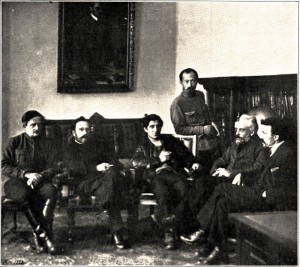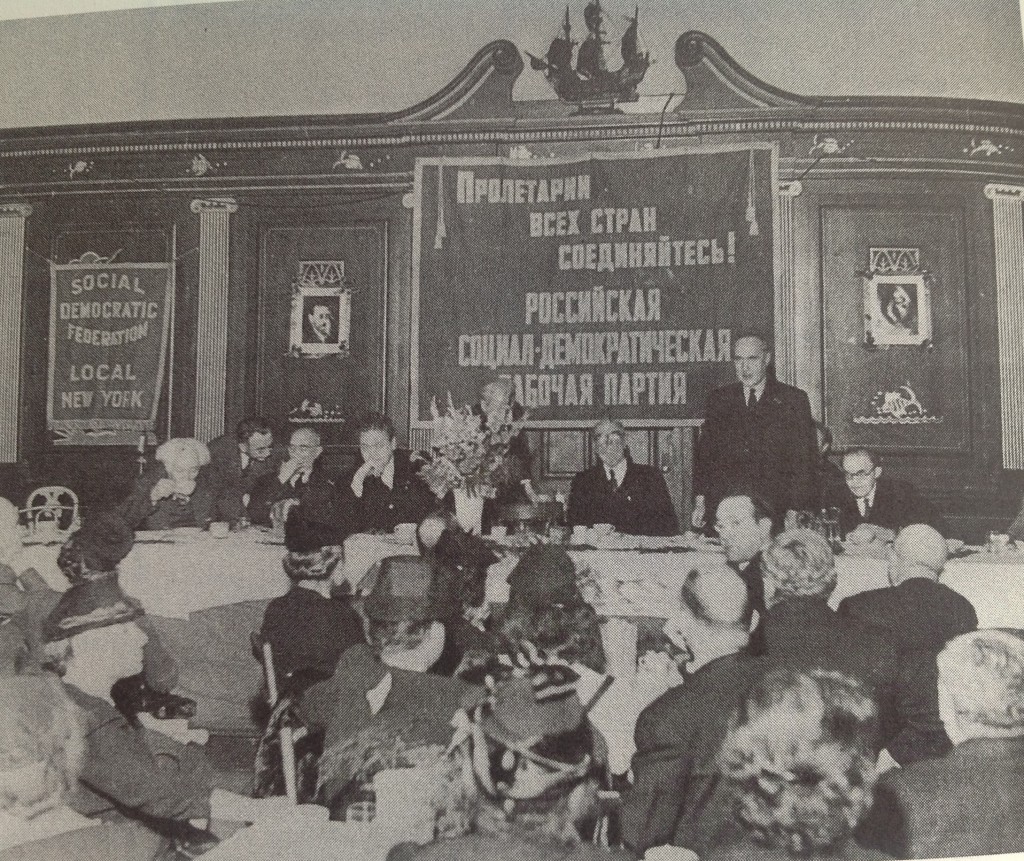Below is an excerpt from the programme adapted by the leftists dominated Central Committee of the Mensheviks in July 1919. The introductory section is omitted. The document provided the basis for the alternative economic programme put to the Congress of Soviets in December 1919.
As Francis King, translator of that document, suggests, its interest lies in the fact that it represents a fairly well-defined alternative policy to that of “war communism” then being pursued by the Soviet government. Indeed, its approach in many respects foreshadows the “New Economic Policy”; the changes in economic policy introduced by the Soviet government in the spring of 1921.
Economic Measures
1. The peasants should retain, on a collective or individual basis as they may freely decide, the public and privately owned lands which they seized and parcelled out at the time of the Revolution. Other lands, not as yet distributed, should be leased on a long-term basis to needy peasants and peasant associations, except for those lands on which large-scale model husbandry is being, and can continue to be, carried out by the state or by leaseholders. The decrees abolishing the Committees of the Poor should be put into effect without exception.
Agricultural communes should not be established by force, either directly or indirectly. Government-held supplies, agricultural implements and seed should be equitably distributed not only among communes but to all peasants who need them on communes and soviet lands.
2. The present food supply system should be replaced by one on the following basis:
a. The state should purchase grain at agreed prices involving a large application of the barter principle; it should then be sold at low prices to the poorest dwellers in town and country, with the state making up the difference. The state should make purchases through its agents, co-operatives or private traders on a commission basis.
b. The state should purchase, at a price equal to the cost of production, a certain proportion of the grain surpluses held by the better-off peasants in the more fertile provinces, the proportion being decided with the advice of freely elected representatives of the local peasantry.
c. Grain should be purchased by co-operatives and workers’ organisations, who should at the same time make over the stocks they have procured to government organs concerned with food supply. The state retains the right to requisition supplies from large landowners who are deliberately hoarding them for speculative purposes. Transport arrangements are under the primary control of the state, co-operatives and workers’ organisations. All anti-profiteer detachments should be disbanded. The transfer of foodstuff from a particular locality shall not be prohibited save in exceptional circumstances and by a decision of the central legislature.
The state shall assist, materially and by administrative measures, the transfer of workers and their families from places where food is scarcest and their resettlement in fertile areas.
3. The state should retain control of major industrial enterprises that are fundamental to economic life, such as mines, metallurgical plant, the chief branches of the metal-working industry, etc. However, in all places where this seems likely to improve or animate production or to extend its range, recourse may be had to organising such enterprises by a combination of state and private capital, by the compulsory formation of a trust under state control or, in exceptional cases, by means of a concession.
All other large industrial enterprises except where state control is desirable for fiscal or other reasons and would not be deleterious to production, should as a rule be gradually transferred into private hands, by leasing to a co-operative or a new entrepreneur, or to the former owner on condition that he accepts the obligation to restore and organise production. The state shall regulate the distribution of fuel and raw materials to different branches of production, enterprises and areas.
4. Small-scale industry should in no case be nationalised.
5. The state shall regulate the distribution to different areas, in accordance with a fixed plan, of the chief articles of mass consumption such as textiles, farm implements, salt, lighting materials etc with the aid of co-operatives and private traders.
6. As regards trade in other articles of the firs necessity and also in luxuries, the state should refrain from imposing restrictions and should allow co-operatives and private enterprises to function freely except in cases where regulation or even monopoly is desirable on account of the extreme scarcity of the product, e.g. medical supplies.
7. The credit system should be so reorganised as to facilitate in every way the use in trade and industry of available funds accumulate by producers in town and country and to afford scope for private initiative in trade, industry and agriculture.
8. The repression of speculation and trading abuses should be left to the courts and governed by specific legal provisions. All arbitrary acts of requisition, confiscation and the detention of goods should be punished. The law should protect rights of ownership in the case of all industrial and commercial concerns that are released from nationalisation. In future, when expropriation is required by the public interest it should take place on the basis of a decision by the supreme legislative bodies and on conditions determined by them.
9. Workers’ unions, in addition to taking a direct part in the work of regulatory bodies, are also and primarily representatives of the interests of the proletariat vis-a-vis the sate and private entrepreneurs. In this latter capacity they should be wholly independent of any state bodies.
10. Wage rates in state enterprises should be raised and minimum rates fixed for private enterprises in accordance with the commercial price-level for necessary goods….
11. The decree on consumers’ communes should be revoked. Workers’ and general co-operatives should be preserved as autonomous organisations, without the imposition of appointees or other interference in their internal affairs. They should also have the right to carry on non-commercial activity such as publishing, education, etc.
Political Measures

Bolsheviks Enukidze, Kamenev, Avanesov, Dzherzhinskii, Smidovich, Rykov of the Central Executive Committee.
1. The right of voting for members of soviets should be extended to all workers of both sexes. Town and village soviets should be elected by all workers, with a secret ballot and freedom of canvassing by word of mouth and by the press. Soviets and Executive Committees should be subject to re-election at fixed intervals. Soviets shall not be entitled to exclude individual members or groups from their midst on political grounds. All officials and public bodies shall be subordinate to local soviets and Central Executive Committees.
2. The Central Executive Committee of Soviets should once more function as the supreme legislative and administrative body, its proceedings being open to public observation. NO law shall come into force without being discussed and approved by the CEC.
3. Freedom of the press, of assembly and of association should be restored, and any party representing the workers shall have the right and be allowed to use premises for meeting, paper supplies, printing workers. Etc. Any restriction of this right that may be necessitated by the war against counter-revolution shall be established and clearly defined by the legislature; it shall not infringe the basic liberty and shall be applied only by the courts and institutions under their direct control.
4. The Revolutionary Tribunals shall be reorganised in such a way that the judges are elected by all the workers. Together with their subordinate investigatory commissions they shall have sole responsibility for combating counter-revolution. All officials should be directly liable to prosecution before these Tribunals for illegal acts committed in the execution of their duties, at the suit of the injured party in each case. Terror shall be done away with as an instrument of government; the death penalty be abolished , and likewise all investigatory and punitive organs independent of the courts, such as the Extraordinary Commission (CHEKA).
5. Party institutions and cells should be deprived of state authority, and party members of all material privileges.
6. The bureaucratic apparatus should be simplified by the extension of local self-government.
7. A policy of understanding should be pursed vis-a-vis the nationalities which have for any reason broken away from Russia, in order to put a speedy end to the Civil War an restore the unity of the state on a basis of national self-determination. The Cossack districts – Don, Kuban, Tersa, The Urals, Astrakhan, Orenburg, etc – should be allowed the widest possible autonomy and there should be no interference in their internal affairs or system of land tenure. Siberia should have regional self-government, and the independence of Finland and Poland should be recognised.
Central Committee of the RSDLP, 12 July 1919
Sotsial-demokratiia i revolutionsiaa. Sbornik dokumentov (Odessa, 1920), pp 9-15.

25th anniversary celebrations of Sotsialistchesky vestnik, the Menshevik paper founded in exile in Berlin by Martov, and later produced in Paris and finally New York until the 1960s. At the head table, from left to right: Chernov, Lee, Abramovitch, Nicolaevesky, unidentified, de Brouckere, Tsereteli. The banner, which is flanked by portraits of Martov and Marx, reads “Proletarians of all countries, unite! Russian Social Democratic Labour Party”.
Excerpted from Abraham Ascher (ed.), The Mensheviks in the Russian Revolution, Thames & Hudson, London, 1976, pp. 111 – 117











